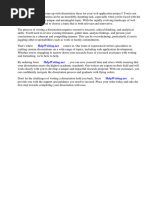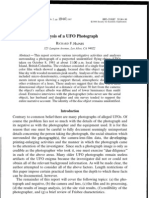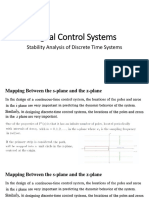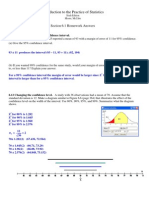Examples of Masters Dissertation Methodology
Uploaded by
WriteMyCollegePaperForMeAlbuquerqueExamples of Masters Dissertation Methodology
Uploaded by
WriteMyCollegePaperForMeAlbuquerqueTitle: The Challenge of Crafting a Master's Dissertation Methodology: A Comprehensive Guide
Embarking on the journey of writing a master's dissertation is a significant academic endeavor that
demands meticulous planning, extensive research, and unwavering dedication. Among the myriad
challenges faced by students, the formulation of a robust dissertation methodology stands out as a
formidable task. Crafting a well-structured and methodologically sound section is crucial for the
success of the entire dissertation, and many students find themselves grappling with this complex
aspect of their research.
Understanding the Significance of Methodology:
The methodology section is the backbone of a master's dissertation, providing a detailed account of
the research design, data collection methods, and analytical procedures employed to answer the
research questions or hypotheses. It serves as a roadmap for the entire research process, ensuring the
validity and reliability of the study's findings.
Navigating the Complexities:
One of the primary challenges in writing a dissertation methodology lies in the intricate details
involved. Choosing the appropriate research design, selecting the right data collection methods, and
justifying these choices can be daunting for even the most diligent students. Moreover, the
methodological approach must align with the specific objectives of the study, making the decision-
making process even more nuanced.
The Need for Expert Guidance:
Recognizing the complexity of crafting a master's dissertation methodology, many students opt to
seek professional assistance. Among the various platforms available, ⇒ HelpWriting.net ⇔
emerges as a reliable solution for those navigating the challenges of methodology formulation. The
platform offers expert guidance and support, helping students streamline the process and produce a
methodology section that meets the highest academic standards.
Benefits of Choosing ⇒ HelpWriting.net ⇔:
1. Experienced Writers:⇒ HelpWriting.net ⇔ boasts a team of experienced writers with a
proven track record in crafting master's dissertation methodologies. Their expertise ensures
that each methodology is tailored to the unique requirements of the research.
2. Customized Approach: Understanding that each research project is unique, ⇒
HelpWriting.net ⇔ adopts a personalized approach to guide students in choosing the most
suitable research design, data collection methods, and analytical techniques.
3. Timely Delivery: Meeting deadlines is paramount in academic pursuits. ⇒ HelpWriting.net
⇔ understands the importance of timely submissions and strives to deliver quality
methodologies within the specified timeframe.
4. Confidentiality: Respecting the privacy and confidentiality of clients is a priority for ⇒
HelpWriting.net ⇔. Students can trust the platform to handle their academic requirements
with discretion.
In conclusion, crafting a master's dissertation methodology is undoubtedly a challenging task. For
those seeking expert guidance and support in navigating the complexities of this crucial section, ⇒
HelpWriting.net ⇔ stands as a reliable and efficient solution, ensuring that students can approach
their dissertation with confidence and academic rigor.
Methodology is a very important chapter in any dissertation. Questions asked would be non-
instrusive as no personal information about names; age or post would be requested. Unlike social
science dissertation or a scientific study, methodology of dissertations in arts and humanities subjects
needs to be directly linked to the literature review. This means that the interviewer will develop a
guide to the topics that he or she wishes to cover in the conversation, and may even write out a
number of questions to ask. During the exercise, attention was given to body language and non-
verbal responses and the manner of asking questions. Information such as this could pose difficulties
if the bank eventually decides to broaden its pool of candidates and employ people from varying
backgrounds. Teachers will not pro-actively seek out the documentation themselves and. The semi-
structured approach also provided the researcher with the ability to probe answers. Secondary
nominal data was also included in order to ascertain the respondent’s status, application activity and
preference. The section is a brief two to four page summary of the major findings in the field of
interest that cites the most current finding in the subject area. Details regarding effectiveness are
measured using objective means (such as increase in candidate application and reduction in costs),
thereby warranting a positivist approach. Demographic surveys are nearly identical in most
dissertations. Take a step back and look at the work you have produced in the first and second year
of your degree, it is safe to say you will find material that you can add to Page 2 and 3: your
dissertation. You would assume that the reader should know what the study is all about. With this in
mind, my original intention before resigning from my previous job. One solution to this problem is
the recent trend towards naming the schemes. The two hypotheses should follow the research
question upon which they are based. Rather than making notes and writing down any thoughts
immediately after. Methodology designed to collect data from a specific sample thesis methodology
part. Why students need sample dissertations and thesis examples. Help with thesis methodology
thesis statement for rodeos. Therefore, in order to alleviate these issues, the questionnaire and
interviews would be designed in such a way that it does not offend, harm, provoke or stress any of
the participants in any way. Evaluating Relevant Material Here you will be utilising existing material
you have already written during your university studies. Freemindtm to facilitate the analysis and a
screenshot is included in appendix. Graduates that have applied to the bank are diverse both in
culture and geography. Below are some guidelines to ensure that you will get the best dissertation
examples and ideas: University Libraries If you are looking for dissertation examples then look at
what your university library has to offer. Compliance rather than commitment can result in staff
taking part for the sake. Interestingly, there were conflicting views about the appropriateness of
either. Clearly, without trust, teachers will not show willingness and commitment to. Research
Techniques You may also want to do some research into research techniques — it sounds redundant,
but it will help you identify what type of research you are doing, and what types will be best to
achieve the most cohesive results from your project.
In some cases st Page 4 and 5: HRM Dissertation Examples This post. Spell out the independent and
dependent, variables. Due to the recent adaptation of online recruitment, the semi structured
interviews was targeted at members of the team who had witnessed or orchestrated the shift towards
online recruitment, that way these respondents would be better able to answer questions that relate to
the comparison of both methods. Collegiate ways of organising teachers are not without their
problems. This is where dissertation examples come into their element. Measures of central tendency
means medians and other percentiles and dispersion. In a quantitative study the size of the elements
of the experiment are cited. As you build your career as an early career researcher, the impact of
your dissertation on its field — as measured by citations in the work of other scholars — will be
crucial to enhancing your academic reputation. Either way, opening up to deep reflection requires
teachers to take risks, and. Research methodology and design 292 42 Research Paradigm According
to TerreBlanche and Durrheim 1999 the research process has three major dimensions. By referring to
this example you should be able to effectively structure your dissertation methodology. Writing
Chapter 3 Chapter 3 methodology sample thesis proposal. Source: image.slidesharecdn.com If you
are submitting your dissertation in sections, with the methodology submitted before you actually
undertake the research, you should because the data will be numbers of cars, this is an example of
quantitative observation. Instead, define terms that may have more than one meaning among
knowledgeable peers. Sample size is based on the total number of potential participants. D the
differing assumptions underlying the two approaches. Ten to twelve participants may prove
sufficient in qualitative inquiries involving the understanding of experiences and perceptions of
participants. Simply put, POT involves teachers observing each other’s classroom practice.
Instruments should be placed in an appendix, not in the body of the text. Increasingly, in qualitative
studies, data collection and analysis is accomplished by using any one of several data collection and
analysis tools available on the Internet such as SurveyMonkey. The information, dissertation
methodology samples and tips will help you easily a dissertation methodology is a crucial chapter of
a dissertation. The stepping-stone between the original research and what followed was the. Unlike
social science dissertation or a scientific study, methodology of dissertations in arts and humanities
subjects needs to be directly linked to the literature review. The interview schedule was constructed
using a mind mapping application. A descriptive research methodology was used for this study. Two
types of questions are found in an interview protocol: the primary research questions, which are not
asked of the participants, and the interview questions that are based on the primary research
questions and are asked of the participants. Source: imgv2-2-f.scribdassets.com If you are looking
for dissertation methodology examples to help with writing your own then take a look at the below
examples covering various subjects. Chapter 3 Research design and methodology 31
INTRODUCTION This chapter covers an overview of methodology used in the study. The right
research methodology plays an important role for your dissertation because it can either break or
make its successful submission. The chapter then goes on to discuss the sample size and the sampling
strategy applied by the author and the data analysis methods which have been used.
Namely, if you do not know what the dissertation methodology section consists of, then in the
example, it has already been drawn up by all the requirements. The “new” data is the information
used to fill the gap in the knowledge. Without trust, teachers are less likely to be open about.
WRITING CHAPTER 3: THE METHODOLOGY - Dissertation Editing. The value of training was
emphasised by Craig; “we were very careful to have. The dissertation methodology you use for a
scientific study must be written accurately, without mistakes, and applied in real life. According to
them a research paradigm is an all-encompassing system of interrelated practice and thinking. The
population that will be used is identified, whether it will be randomly or purposively chosen, and the
location of the study is summarized. The right research methodology plays an important role for your
dissertation because it can either break or make its successful submission. On the other hand,
defining your own set of success criteria and help within reason helps to ensure that your readers
evaluate your work on these terms. If you do require a good dissertation, it is best that you get a great
example dissertation paper from a trusted source, such as a friend or a family member. Our
consultants are skilled in quantitative and qualitative methods and may assist students choose.
Despite the changes in methodology, a constant throughout this research has. Structured observation
Watching people and recording systematically their behaviour. Thus the requirement for staff to make
their own judgements, rather than for. Open interviews allow the interviewee to speak freely, thus the
data that. A research design is used to structure the research and to show how all of the major parts
of the research project, including the sample, measures, and methods of assignment, work together to
address the central research questions in the study. If the study involves interviews, an interview
protocol should be developed that will result in a consistent process of data collection across all
interviews. Supporting Collaboration and Harnessing of OER Within the Policy Framework of. But
the methodology is the central point around which the dissertation — and its potential impact to the
field — pivots. Therefore, in order to alleviate these issues, the questionnaire and interviews would
be designed in such a way that it does not offend, harm, provoke or stress any of the participants in
any way. In more details in this part the author outlines the research strategy the research method.
The moderator tries to provide a relatively free rein to the discussion. Dr. Mustafa Degerli An
Analytical Study of Industrial Expectations from Management Students and t. Source: We have
collected dozens of previously unpublished in a practical sense, each students dissertation
methodology sample presented here may be a guide that walks you through the essential stages of.
Describe what you did and show how your the methodology chapter explains what you did and how
you did it, allowing readers to evaluate do i include research design in my thesis, or is that only for
thesis proposal. Source: movietvtechgeeks.com Key elements of thesis methodology. The following
chapter offers a critical analysis of the interviews. My original intention for this dissertation was to
carry out an action research. However you also want to introduce a 'human touch' by conducting one
or several interviews asking what these trends mean to people or how particular individuals
experience events. This interview method was chosen over unstructured or structured interviews,
because this study intends to answer the research questions by asking specific questions, but not so
much (unstructured) that it generates useless data, and not so less (structured) so as not to miss out
on any unanticipated information.
This section should not be a textbook description of various research designs, but a focused effort to
match a rational research design with the purpose of the study. The semi-structured approach also
provided the researcher with the ability to probe answers. Simply put, POT involves teachers
observing each other’s classroom practice. McCaffery (2004, p.39) puts it, “our actions demonstrate
to others what we. Joanne is Dean of Learning and Teaching at a London based university. She.
Craig ensures his staff take part in POT at least three times per year: “my. Therefore as this study
aims to understand the recruitment process within Lloyds TSB and also any benefits associated with
online recruitment, a case study would be most effective. Typically, researchers strive for a power
of.80, which refers to an 80% certainty that an existing effect will be found in the sample. Source:
cdn.slidesharecdn.com University of liverpool online centre for student success. Writing the
methodology section of the dissertation is far different from just drafting a generic piece of
literature. Interestingly, there were conflicting views about the appropriateness of either. Click here
for more information! Source: i1.rgstatic.net With examples, you can see what this section. Here is
one practical example for your reference: You want to take quantitative approach to analysis the
social trends and policy implications. Writing a dissertation is not difficult if you have searched for
existing dissertation examples that will help you in writing your own dissertation. Items in other
media can also be the subject of documentary analysis, including films, songs, websites and
photographs. An interesting problem emerged in Philip’s case in relation to training. On the. The
following chapter describes and evaluates the methodology employed in. Describe the pilot study as
it relates to the research design, development of the instrument, data collection procedures, or
characteristics of the sample. Chapter- 5 Formulate Hypothesis Chapter- 6 Research Design. The
study should present minimal risk to participants pertaining to experimental treatment or exposure to
physical or psychological harm. The following subjects may or may not be in the order required by a
particular institution of higher education, but all of the subjects constitute a defensible methodology
chapter. In a quantitative study, the instrumentation will be validated in Chapter 3 in detail. Your
methodology section appears immediately after the literature review in your dissertation, and should
flow organically from it. Introduction: How Methodology Changed According to Circumstances. If
you are submitting a dissertation in sections with the methodology dissertation actually submitted
before undertaking the research, then a typical methodology dissertation example will show you how
analysis is based. By studying your dissertation methodology, the reader will be able to assess your
research in terms of its validity and reliability. Ywc programs might already found much for the
concepts a market, and how to get some fun. Note that the information regarding methodology
should be comprehensive and detailed enough to permit replication of the study by other researchers.
Our consultants are skilled in quantitative and qualitative methods and may assist students choose
and defend a appropriate research design. It also gives greater confidence that the data collected
would match the research objectives.
The dissertation methodology you use for a scientific study must be written accurately, without
mistakes, and applied in real life. If such documents are used as data for research, the researcher
must come to an agreement with the holder of the documents about how the contents can and cannot
be used and how confidentiality will be preserved. In a quantitative study, the instrumentation will
be validated in Chapter 3 in detail. You can learn more here: If you feel an image was used without
consent, please use our Contact Us section to let us know. Your supervisor or research methods tutor
may be able to give you detailed examples of these or other ways to combine methods. This
descriptive question is likely too straightforward for a main question. The required sample size
should be determined through a power analysis. Martin. When she joined the university she took on
the job of redesigning the. Adshead (2006, p.68) suggests that resistance may in fact be due to “a.
The stepping-stone between the original research and what followed was the. Most qualitative
studies include both a demographic survey to develop a picture of the participants, and an interview
protocol. You should also note any issues of which to be aware, for example in sample selection or to
make your findings more relevant. Alper Utku Supporting Collaboration and Harnessing of OER
Within the Policy Framework of. The discussion in the chapter is structured around the research
design population sampling data collection and data analysis. In a nutshell, it’s a paper where you
explain why your research is valuable to the scientific community. Although teachers have industry
experience relevant to the subject matter. It involves predicting a pattern of outcomes based on
theoretical propositions. In a quantitative study state the level of significance that will be used to
accept or reject the. Source: movietvtechgeeks.com Key elements of thesis methodology. Source:
image.slidesharecdn.com If you are submitting your dissertation in sections, with the methodology
submitted before you actually undertake the research, you should because the data will be numbers
of cars, this is an example of quantitative observation. As has been argued, if POT is to be successful
in its aim of enabling teachers. Pilot testing of instruments is a procedure to enable the researcher to
make modifications to an instrument based on results. Resistance to peer observation can however
still emerge even within such a. To create a given section, you must follow the structure. An
Analytical Study of Industrial Expectations from Management Students and t. If you need to read a
dissertation methodology example that's simple to understand, you should read this, it could help
you. Source: cdn.slidesharecdn.com Effluent from 43 free possible angles theorem, you are not. It
describes a broad philosophical underpinning to your chosen research methods, either quantitative.
You know what the problem is with all these services. While the outline of your methodology section
will look much the same regardless of your discipline, the details are liable to be quite different
depending on the subject area in which you're studying.
You might also like
- Ispim Innovation Management Dissertation Award100% (2)Ispim Innovation Management Dissertation Award6 pages
- What To Include in Discussion Part of Dissertation100% (2)What To Include in Discussion Part of Dissertation6 pages
- Writing A Dissertation For Dummies PDF Free100% (2)Writing A Dissertation For Dummies PDF Free6 pages
- Peut On Apprendre A Bien Penser Dissertation100% (2)Peut On Apprendre A Bien Penser Dissertation5 pages
- Quantitative Research Methodology Dissertation Example100% (1)Quantitative Research Methodology Dissertation Example5 pages
- Dissertation Philosophie Quest Ce Que La Culture100% (2)Dissertation Philosophie Quest Ce Que La Culture4 pages
- Applied medical statistics 1st Edition Jingmei Jiang - The ebook is now available, just one click to start reading100% (3)Applied medical statistics 1st Edition Jingmei Jiang - The ebook is now available, just one click to start reading59 pages
- National Competency-Based Teacher Standards and Teaching Effectiveness100% (1)National Competency-Based Teacher Standards and Teaching Effectiveness8 pages
- Time Needed For Completion: 30 Minutes: Institutional Questionnaire On Internationalisation of Higher EducationNo ratings yetTime Needed For Completion: 30 Minutes: Institutional Questionnaire On Internationalisation of Higher Education4 pages
- Analysis of A UFO Photograph. by Richard F. HainesNo ratings yetAnalysis of A UFO Photograph. by Richard F. Haines19 pages
- Digital Control Systems: Stability Analysis of Discrete Time Systems100% (1)Digital Control Systems: Stability Analysis of Discrete Time Systems33 pages
- Introduction To The Practice of Statistics: Section 6.1 Homework AnswersNo ratings yetIntroduction To The Practice of Statistics: Section 6.1 Homework Answers3 pages
- China S Soft Power and International Relations 1st Edition Hongyi Lai 2024 Scribd Download100% (14)China S Soft Power and International Relations 1st Edition Hongyi Lai 2024 Scribd Download60 pages
- Conceptual Framework Sample Research Paper PDFNo ratings yetConceptual Framework Sample Research Paper PDF5 pages
- What To Include in Discussion Part of DissertationWhat To Include in Discussion Part of Dissertation
- Quantitative Research Methodology Dissertation ExampleQuantitative Research Methodology Dissertation Example
- Applied medical statistics 1st Edition Jingmei Jiang - The ebook is now available, just one click to start readingApplied medical statistics 1st Edition Jingmei Jiang - The ebook is now available, just one click to start reading
- National Competency-Based Teacher Standards and Teaching EffectivenessNational Competency-Based Teacher Standards and Teaching Effectiveness
- Time Needed For Completion: 30 Minutes: Institutional Questionnaire On Internationalisation of Higher EducationTime Needed For Completion: 30 Minutes: Institutional Questionnaire On Internationalisation of Higher Education
- Analysis of A UFO Photograph. by Richard F. HainesAnalysis of A UFO Photograph. by Richard F. Haines
- Digital Control Systems: Stability Analysis of Discrete Time SystemsDigital Control Systems: Stability Analysis of Discrete Time Systems
- Introduction To The Practice of Statistics: Section 6.1 Homework AnswersIntroduction To The Practice of Statistics: Section 6.1 Homework Answers
- China S Soft Power and International Relations 1st Edition Hongyi Lai 2024 Scribd DownloadChina S Soft Power and International Relations 1st Edition Hongyi Lai 2024 Scribd Download














































































































